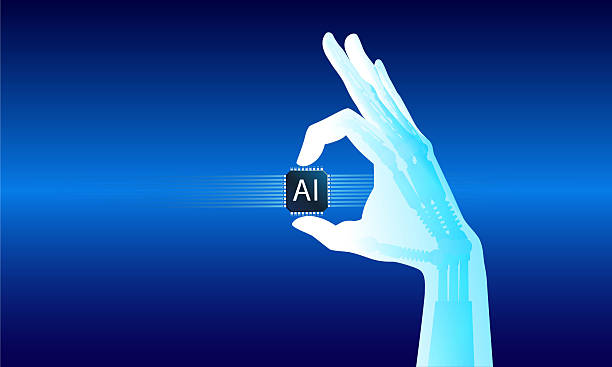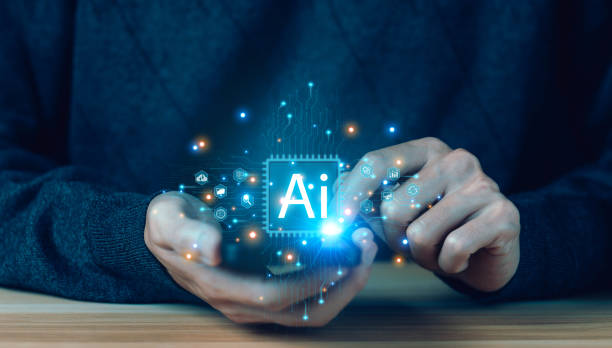What is Artificial Intelligence? Definitions and Basic Concepts
What is Artificial Intelligence? Definitions and Basic Concepts
#Artificial_Intelligence (AI) is a branch of computer science dedicated to building intelligent machines, especially intelligent computer programs.
This field seeks to create systems that can perform tasks that typically require human intelligence.
AI strives to enable machines to learn, reason, solve problems, understand, and process natural language.
In other words, the goal of AI is to imitate or simulate human intelligence in machines.
AI includes various subfields such as Machine Learning (Machine Learning), Natural Language Processing (Natural Language Processing), Computer Vision (Computer Vision), and Robotics.
These systems can recognize patterns, make decisions, and even show creativity.
Is your online sales not as you expected? With RasaWeb, solve the problem of low sales and poor user experience forever!
✅ Increase visitor-to-customer conversion rate
✅ Create an enjoyable user experience and boost customer trust
⚡ Act now to get a free consultation!
A Brief History of Artificial Intelligence From Dream to Reality
A Brief History of Artificial Intelligence From Dream to Reality
The idea of artificial intelligence dates back to the 1950s when pioneers like Alan Turing and John McCarthy began exploring the possibility of creating thinking machines.
The Dartmouth Conference in 1956 is recognized as a turning point in the history of artificial intelligence.
In the early decades, the focus was on solving symbolic problems and developing expert systems.
However, progress slowed in the 1980s, which became known as the “AI winter.”
In subsequent decades, with significant advancements in computational power and access to big data, AI regained its prominence.
Today, AI plays a role in many aspects of our lives, including voice assistants, autonomous vehicles, and recommendation systems.
Types of Artificial Intelligence From Narrow to General
Types of Artificial Intelligence From Narrow to General
Artificial intelligence can be divided into two main categories: Narrow AI and General AI.
Narrow AI is designed to perform specific tasks and excels in those areas.
Examples of Narrow AI include facial recognition systems, spam filters, and recommendation systems.
General AI, also known as Artificial General Intelligence (AGI), has the ability to perform any intellectual task that a human can do.
General AI is still in the research stages and has not yet been realized.
Furthermore, AI can be divided into two categories based on learning ability: supervised learning and unsupervised learning.
In supervised learning, the system is trained with labeled data, while in unsupervised learning, the system extracts patterns from unlabeled data.
| Type of AI | Description | Examples |
|---|---|---|
| Narrow AI | Focused on performing specific tasks | Facial recognition systems, spam filters |
| General AI | Ability to perform any intellectual task | Still in research stages |
Click here to preview your posts with PRO themes ››
Applications of Artificial Intelligence in Everyday Life From Medicine to Transportation
Applications of Artificial Intelligence in Everyday Life From Medicine to Transportation
Artificial intelligence is currently present in many aspects of our lives.
In medicine, AI is used for diagnosing diseases, developing drugs, and personalizing treatment.
In transportation, self-driving cars and traffic management systems benefit from AI.
In industry, smart robots and automation systems improve production lines.
In finance, AI is used for fraud detection, risk management, and providing personalized financial services.
In education, intelligent tutoring systems and adaptive learning tools help students learn better.
These are just a few examples of the widespread applications of artificial intelligence in today’s world.
Are you tired of losing business opportunities due to not having a professional corporate website?
RasaWeb, with its professional corporate website design, helps you:
✅ Build a powerful and reliable image for your brand
✅ Convert website visitors into loyal customers
⚡ Get a free consultation right now!
Machine Learning The Backbone of Artificial Intelligence
Machine Learning The Backbone of Artificial Intelligence
Machine learning is a subset of artificial intelligence that allows machines to learn from data without being explicitly programmed.
In machine learning, algorithms are trained using data and then use this training to make predictions or decisions on new data.
There are various types of machine learning algorithms, including supervised learning, unsupervised learning, reinforcement learning, and deep learning.
Deep learning, which uses deep neural networks, has achieved significant successes in recent years and is used in many AI applications, including computer vision and natural language processing.
Natural Language Processing Understanding and Generating Human Language
Natural Language Processing Understanding and Generating Human Language
Natural Language Processing (NLP) is a branch of artificial intelligence that helps machines understand and generate human language.
NLP includes tasks such as speech recognition, machine translation, text summarization, and sentiment analysis.
NLP systems use machine learning algorithms and language models to process and analyze text.
NLP is used in many applications, including voice assistants, chatbots, and machine translation systems.
Computer Vision Seeing and Understanding the Visual World
Computer Vision Seeing and Understanding the Visual World
Computer Vision is a branch of artificial intelligence that helps machines understand images and videos.
Computer Vision includes tasks such as object recognition, facial recognition, analysis of medical images, and processing of satellite images.
Computer Vision systems use machine learning algorithms and deep neural networks to process and analyze images.
Computer Vision is used in many applications, including self-driving cars, security systems, and robotics.
| Application Area | Description | Examples |
|---|---|---|
| Self-driving cars | Recognition of traffic signs, obstacle detection | Pedestrian detection, lane recognition |
| Security systems | Facial recognition, detection of suspicious activities | Intrusion detection, theft detection |
Click here to preview your posts with PRO themes ››
Challenges and Limitations of Artificial Intelligence From Bias to Ethics
Challenges and Limitations of Artificial Intelligence From Bias to Ethics
Artificial intelligence faces numerous challenges and limitations.
One of these challenges is data bias.
If the training data for an AI system contains bias, the system will also make discriminatory decisions.
Another challenge involves ethical issues related to AI, including accountability for decisions made by AI systems and data privacy.
Additionally, there are concerns about the replacement of human jobs by machines and the social and economic impacts of artificial intelligence.
Did you know that poor online store design can drive away up to 70% of your potential customers? RasaWeb transforms your sales with professional and user-friendly e-commerce website designs.
✅ Significant increase in sales and revenue
✅ Full optimization for search engines and mobile
⚡ [Get a free consultation from RasaWeb now!]
The Future of Artificial Intelligence What Should We Expect?
The Future of Artificial Intelligence What Should We Expect?
The future of artificial intelligence looks very bright and promising.
It is expected that AI will play an increasingly important role in our lives in the coming years and bring about significant transformations in many fields.
Advancements in machine learning, natural language processing, and computer vision will lead to the creation of smarter and more powerful systems.
However, it is essential that the challenges and limitations of artificial intelligence are also seriously addressed to ensure its responsible and ethical development.
Artificial intelligence will increasingly become an integral part of everyday life.
How to keep pace with Artificial Intelligence ?
How to keep pace with Artificial Intelligence ?
To keep pace with advancements in artificial intelligence, it is necessary to keep our knowledge and skills in this field updated.
Participating in training courses, studying articles and books, and following news and developments in AI can help us stay informed about the latest advancements.
Also, developing AI-related skills such as programming, statistics, and machine learning can help us utilize this technology in our work and life.
By understanding the potential and limitations of artificial intelligence, we can effectively use it to improve our lives and work.
Frequently Asked Questions
| Question | Answer |
|---|---|
| What is Artificial Intelligence? | It is the simulation of human intelligence in machines programmed to think like humans and imitate their actions. |
| What are the main branches of Artificial Intelligence? | They include Machine Learning, Deep Learning, Natural Language Processing, Computer Vision, and Robotics. |
| What is Machine Learning? | It is a branch of Artificial Intelligence that focuses on enabling systems to learn from data and identify patterns without explicit programming. |
| Mention examples of Artificial Intelligence applications in our daily lives. | Voice assistants (like Siri and Alexa), recommendation systems in Netflix and Amazon, self-driving cars, and facial recognition programs. |
| What is Deep Learning? | It is a subset of Machine Learning that uses multi-layered (deep) artificial neural networks to process large amounts of data. |
| What is Natural Language Processing (NLP)? | It is a branch of Artificial Intelligence that focuses on enabling computers to understand, interpret, and generate human language. |
| What are some ethical concerns related to Artificial Intelligence? | They include data bias, privacy, job loss, and accountability in case of errors. |
| What are the main benefits of Artificial Intelligence? | Increased efficiency, improved decision-making, automation of repetitive tasks, and discovery of complex patterns in data. |
| How is Artificial Intelligence used in healthcare? | In diagnosing diseases, drug discovery, analysis of medical images, and personalized patient care. |
| How do you see the future of Artificial Intelligence? | It is expected to continue evolving rapidly, affecting all aspects of human life, from industry to education and entertainment. |
Click here to preview your posts with PRO themes ››
And other services of RasaWeb advertising agency in the field of advertising
Smart Sales Automation: A combination of creativity and technology to improve SEO ranking through SEO-driven content strategy.
Smart Custom Software: A combination of creativity and technology to analyze customer behavior by optimizing key pages.
Smart Brand Identity: A specialized service for increasing sales growth based on attractive UI design.
Smart SEO: An effective tool for attracting customers with the help of real data.
Smart Conversion Rate Optimization: An effective tool for online growth with the help of custom programming.
And over hundreds of other services in the field of internet advertising, advertising consultation, and organizational solutions
Internet Advertising | Advertising Strategy | Advertorials
Sources
AI News on IRNAAI Articles on ISNAAI Technology on ZoomitWhat is AI on Virgool
📍 RasaWeb Afarin Digital Marketing Agency, your comprehensive solution for growth and visibility in the online space. With our specialized services, including multilingual website design, take your business to its peak.
📍 Tehran, Mirdamad Street, next to Central Bank, Kazeroun Jonoubi Alley, Ramin Alley, No. 6














